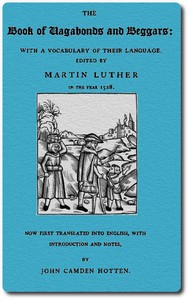The Book of Vagabonds and Beggars, with a Vocabulary of Their Language by Luther et al.
"The Book of Vagabonds and Beggars, with a Vocabulary of Their Language" by Luther et al. is an anonymously authored text first printed around 1509-1510. This German work catalogues twenty-eight types of wandering beggars in medieval society, exposing their alleged deceptive practices and fraudulent methods for soliciting alms. The book includes a glossary of Rotwelsch, the secret cant used by vagrants. Martin Luther later edited editions, adding a preface discouraging charity to
itinerant beggars—a controversial stance that would shape attitudes toward poverty and almsgiving. (This is an automatically generated summary.)
Read or download for free
| How to read | Url | Size | |||
|---|---|---|---|---|---|
| Read now! | https://www.gutenberg.org/ebooks/46287.html.images | 163 kB | |||
| EPUB3 (E-readers incl. Send-to-Kindle) | https://www.gutenberg.org/ebooks/46287.epub3.images | 523 kB | |||
| EPUB (older E-readers) | https://www.gutenberg.org/ebooks/46287.epub.images | 522 kB | |||
| EPUB (no images, older E-readers) | https://www.gutenberg.org/ebooks/46287.epub.noimages | 147 kB | |||
| Kindle | https://www.gutenberg.org/ebooks/46287.kf8.images | 665 kB | |||
| older Kindles | https://www.gutenberg.org/ebooks/46287.kindle.images | 621 kB | |||
| Plain Text UTF-8 | https://www.gutenberg.org/ebooks/46287.txt.utf-8 | 108 kB | |||
| Download HTML (zip) | https://www.gutenberg.org/cache/epub/46287/pg46287-h.zip | 501 kB | |||
| There may be more files related to this item. | |||||
Similar Books
About this eBook
| Editor | Luther, Martin, 1483-1546 |
|---|---|
| Translator | Hotten, John Camden, 1832-1873 |
| LoC No. | 09033840 |
| Uniform Title | Liber vagatorum. English |
| Title | The Book of Vagabonds and Beggars, with a Vocabulary of Their Language |
| Note | Wikipedia page about this book: en.wikipedia.org/wiki/Liber_Vagatorum |
| Credits |
Produced by Chris Curnow, Turgut Dincer and the Online Distributed Proofreading Team at www.pgdp.net (This file was produced from images generously made available by The Internet Archive) |
| Reading Level | Reading ease score: 71.5 (7th grade). Fairly easy to read. |
| Language | English |
| LoC Class | HV: Social sciences: Social pathology, Social and Public Welfare |
| Subject | Begging -- Germany |
| Subject | Wayfaring life -- Germany |
| Subject | German language -- Slang |
| Category | Text |
| EBook-No. | 46287 |
| Release Date | Jul 15, 2014 |
| Most Recently Updated | Oct 24, 2024 |
| Copyright Status | Public domain in the USA. |
| Downloads | 512 downloads in the last 30 days. |
| Project Gutenberg eBooks are always free! | |

